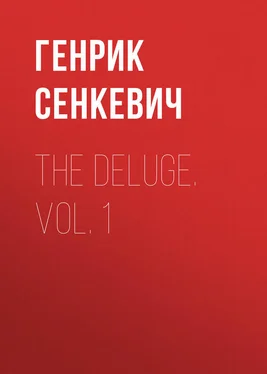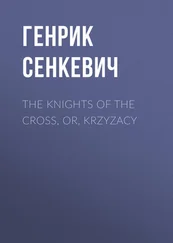Генрик Сенкевич - The Deluge. Vol. 1
Здесь есть возможность читать онлайн «Генрик Сенкевич - The Deluge. Vol. 1» — ознакомительный отрывок электронной книги совершенно бесплатно, а после прочтения отрывка купить полную версию. В некоторых случаях можно слушать аудио, скачать через торрент в формате fb2 и присутствует краткое содержание. Жанр: foreign_antique, foreign_prose, на английском языке. Описание произведения, (предисловие) а так же отзывы посетителей доступны на портале библиотеки ЛибКат.
- Название:The Deluge. Vol. 1
- Автор:
- Жанр:
- Год:неизвестен
- ISBN:нет данных
- Рейтинг книги:4 / 5. Голосов: 1
-
Избранное:Добавить в избранное
- Отзывы:
-
Ваша оценка:
- 80
- 1
- 2
- 3
- 4
- 5
The Deluge. Vol. 1: краткое содержание, описание и аннотация
Предлагаем к чтению аннотацию, описание, краткое содержание или предисловие (зависит от того, что написал сам автор книги «The Deluge. Vol. 1»). Если вы не нашли необходимую информацию о книге — напишите в комментариях, мы постараемся отыскать её.
The Deluge. Vol. 1 — читать онлайн ознакомительный отрывок
Ниже представлен текст книги, разбитый по страницам. Система сохранения места последней прочитанной страницы, позволяет с удобством читать онлайн бесплатно книгу «The Deluge. Vol. 1», без необходимости каждый раз заново искать на чём Вы остановились. Поставьте закладку, и сможете в любой момент перейти на страницу, на которой закончили чтение.
Интервал:
Закладка:
Every day clouds of dust, rising by reason of the dry and settled weather, announced the approach of fresh reinforcements one after another. And the nobles travelled noisily on horses, on wheels, and with crowds of servants, with provisions, with wagons, and abundance on them of every kind of thing, and so loaded with weapons that many a man carried arms of every description for three lances, muskets, pistols, sabres, double-handed swords and hussar hammers, out of use even in that time, for smashing armor. Old soldiers recognized at once by these weapons men unaccustomed to war and devoid of experience.
Of all the nobles inhabiting the Commonwealth just those of Great Poland were the least warlike. Tartars, Turks, and Cossacks had never trampled those regions which from the time of the Knights of the Cross had almost forgotten how war looked in the country. Whenever a noble of Great Poland felt the desire for war he joined the armies of the kingdom, and fought there as well as the best; but those who preferred to stay at home became real householders, in love with wealth and with ease, – real agriculturists, filling with their wool and especially with their wheat the markets of Prussian towns. But now when the Swedish storm swept them away from their peaceful pursuits, they thought it impossible to pile up too many arms, provide too great supplies, or take too many servants to protect the persons and goods of the master.
They were marvellous soldiers, whom the captains could not easily bring to obedience. For example, one would present himself with a lance nineteen feet long, with a breastplate on his breast, but with a straw hat on his head "for coolness;" another in time of drill would complain of the heat; a third would yawn, eat, or drink; a fourth would call his attendant; and all who were in the ranks thought it nothing out of the way to talk so loudly that no man could hear the command of an officer. And it was difficult to introduce discipline, for it offended the brotherhood terribly, as being opposed to the dignity of a citizen. It is true that "articles" were proclaimed, but no one would obey them.
An iron ball on the feet of this army was the innumerable legion of wagons, of reserve and draft horses, of cattle intended for food, and especially of the multitude of servants guarding the tents, utensils, millet, grits, hash, and causing on the least occasion quarrels and disturbance.
Against such an army as this was advancing from the side of Stettin and the plains on the Oder, Arwid Wittemberg, an old leader, whose youth had been passed in the thirty years' war; he came at the head of seventeen thousand veterans bound together by iron discipline.
On one side stood the disordered Polish camp, resembling a crowd at a country fair, vociferous, full of disputes, discussions about the commands of leaders, and of dissatisfaction; composed of worthy villagers turned into prospective infantry, and nobles taken straight from sheep-shearing. From the other side marched terrible, silent quadrangles, which at one beck of their leaders turned, with the precision of machines, into lines and half-circles, unfolding into wedges and triangles as regularly as a sword moves in the hands of a fencer, bristling with musket-barrels and darts: genuine men of war, cool, calm; real masters who had attained perfection in their art. Who among men of experience could doubt the outcome of the meeting and on whose side the victory must fall?
The nobles, however, were assembling in greater and greater numbers; and still earlier the dignitaries of Great Poland and other provinces began to meet, bringing bodies of attendant troops and servants. Soon after the arrival of Pan Grudzinski at Pila came Pan Kryshtof Opalinski, the powerful voevoda of Poznan. Three hundred haiduks in red and yellow uniforms and armed with muskets went before the carriage of the voevoda; a crowd of attendant nobles surrounded his worthy person; following them in order of battle came a division of horsemen with uniforms similar to those of the haiduks; the voevoda himself was in a carriage attended by a jester, Staha Ostrojka, whose duty it was to cheer his gloomy master on the road.
The entrance of such a great dignitary gave courage and consolation to all; for those who looked on the almost kingly majesty of the voevoda, on that lordly face in which under the lofty vaulting of the forehead there gleamed eyes wise and severe, and on the senatorial dignity of his whole posture, could hardly believe that any evil fate could come to such power.
To those accustomed to give honor to office and to person it seemed that even the Swedes themselves would not dare to raise a sacrilegious hand against such a magnate. Even those whose hearts were beating in their breasts with alarm felt safer at once under his wing. He was greeted therefore joyfully and warmly; shouts thundered along the street through which the retinue pushed slowly toward the house of the mayor, and all heads inclined before the voevoda, who was as visible as on the palm of the hand through the windows of the gilded carriage. To these bows Ostrojka answered, as well as the voevoda, with the same importance and gravity as if they had been given exclusively to him.
Конец ознакомительного фрагмента.
Текст предоставлен ООО «ЛитРес».
Прочитайте эту книгу целиком, купив полную легальную версию на ЛитРес.
Безопасно оплатить книгу можно банковской картой Visa, MasterCard, Maestro, со счета мобильного телефона, с платежного терминала, в салоне МТС или Связной, через PayPal, WebMoney, Яндекс.Деньги, QIWI Кошелек, бонусными картами или другим удобным Вам способом.
1
Means "On the sea."
2
Pereyaslav will be remembered by the readers of FIRE AND SWORD as the place where the Polish commissioners with Adam Kisel brought the baton and banner from the king to Hmelnitski.
3
"Two-bridges." the Bipont of page 523, Vol. II.
4
This word means technically "villages inhabited by petty nobles: " etymologically it means "behind walls," – hence, "beyond or outside the walls," as above.
5
This war was carried on by the Tsar Alexis, father of Peter the Great and son of Michael Romanoff. Set Introduction.
6
The speech of the main body of the people in Jmud is Lithuanian to this day.
7
Lithuanian forms, with nominative ending in s and as .
8
The diminutive or more familiar form for Aleksandra. It is used frequently in this book.
9
The diminutive of Andrei.
10
A barber in those parts at that time did duty for a surgeon.
11
Marysia and Maryska are both diminutives of Marya = Maria or Mary, and are used without distinction by the author. There are in Polish eight or ten other variants of the same name.
12
It is the custom to put a watermelon in the carriage of an undesirable suitor, – a refusal without words.
Интервал:
Закладка:
Похожие книги на «The Deluge. Vol. 1»
Представляем Вашему вниманию похожие книги на «The Deluge. Vol. 1» списком для выбора. Мы отобрали схожую по названию и смыслу литературу в надежде предоставить читателям больше вариантов отыскать новые, интересные, ещё непрочитанные произведения.
Обсуждение, отзывы о книге «The Deluge. Vol. 1» и просто собственные мнения читателей. Оставьте ваши комментарии, напишите, что Вы думаете о произведении, его смысле или главных героях. Укажите что конкретно понравилось, а что нет, и почему Вы так считаете.











